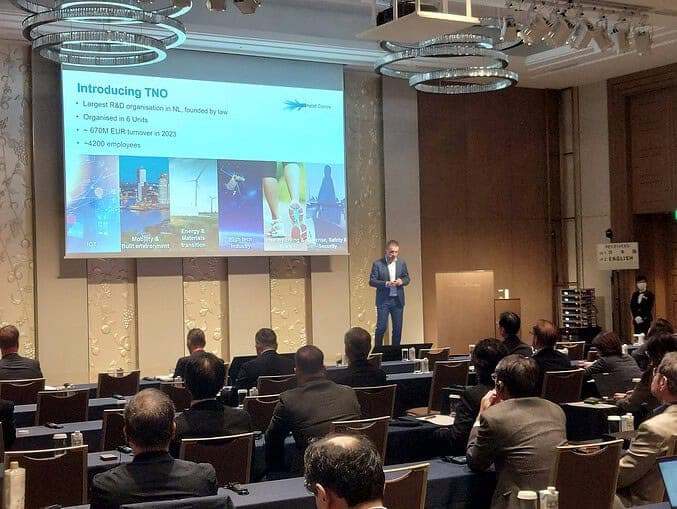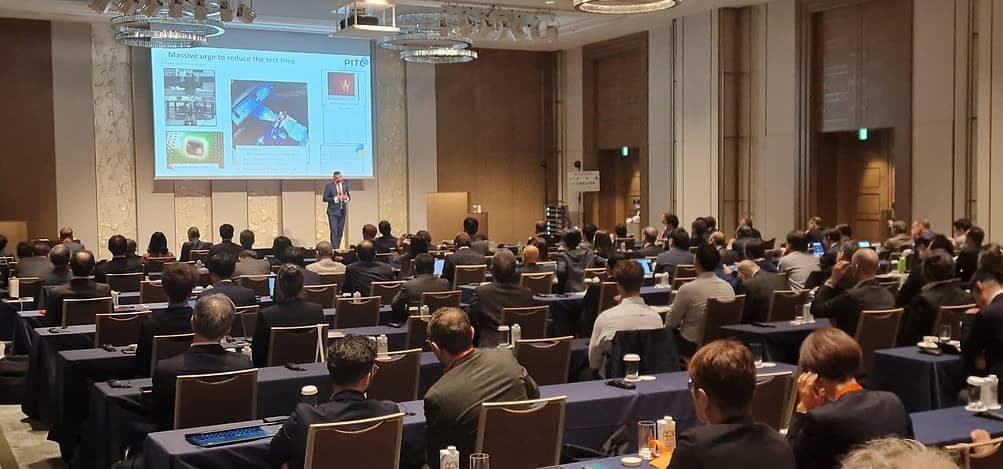Brabant Innovation Day in Tokyo: Bridging innovation in sustainable electronics and integrated photonics
In an era marked by rapid advances in AI and the demand for high-tech solutions, the event emphasized there is no AI without photonics and semiconductors.
Published on November 13, 2024

Bart, co-founder of Media52 and Professor of Journalism oversees IO+, events, and Laio. A journalist at heart, he keeps writing as many stories as possible.
It is a relatively small province in Western Europe, showcasing itself in megacity Tokyo. Sounds weird? Not for North Brabant. Today, this Dutch province hosted its fifth Brabant Innovation Day at The Okura Tokyo. The event is a special one-day 'summit' where research institutes and startups from this region of the Netherlands share their latest innovations. After a full day of speeches, panel discussions, and presentations, one thing stood out for all participants: the two regions have more in common than what is visible outside.
Strong ties already exist between this area of the Southern Netherlands and Japan. Many of the over 80 Japanese companies active in the Dutch province of Brabant are involved in high-tech, working with Dutch companies and research institutions on innovations with a global impact. The Brabant Innovation Day summit aims to strengthen existing partnerships, celebrate successes, and explore new partnerships to accelerate innovation with global societal impact.
A wave of innovations
North Brabant, again, showcased a wave of groundbreaking innovations in sustainable electronics and photonics at the Brabant Innovation Day in Tokyo. This one-day summit brought together leading industry figures and emerging startups, creating a dynamic platform for innovation and collaboration between Japan and the Netherlands.
The event emphasized a critical message in an era marked by rapid advances in AI and the demand for high-tech solutions. There is no AI without photonics and advanced semiconductors. The summit highlighted the Netherlands' contributions to these fields, from breakthrough sensor technologies to photonic chip innovations. It underscored the potential for joint ventures to advance both nations’ technological capabilities.

Strengthening networks
With a focus on fostering cross-border collaboration and deep-tech advancements, the event was like a launchpad for partnerships that bridge industries, borders, and knowledge. As speakers noted, these efforts complement existing research and corporate activities, identifying new opportunities and fostering innovation at the “edge.”
This year's summit theme, “Sustainable Electronics and Photonics,” brought attention to cutting-edge technologies reshaping global markets. On behalf of TNO Holst Centre, a leader in flexible electronics, Ton van Mol showcased the advancements in thermal, optical, and ultrasound sensors. Known for its open days, TNO invited Japanese companies to explore potential industry partnerships. Additionally, TNO hinted at a new program focusing on photonic biosensing, drawing interest from participants eager to address health and environmental challenges through sensor technologies.
The event also hosted Aikon Health and Onera Health, two Dutch medtech startups making waves in the health sector. Aikon Health leverages TNO technology to monitor heart failure, while Onera Health (a former Gerard & Anton award winner) pioneers accessible sleep diagnostics. Tracxon's pioneering work in flexible electronics was another standout, demonstrating how Dutch innovation is fueling new possibilities in health technology. Tracxon was one of this year's laureates at the Gerard & Anton Awards.
PhotonDelta: Building a photonic future
PhotonDelta, one of Europe’s foremost photonics ecosystems, shared insights from the recent PIC Summit. With significant investment in photonic chip infrastructure, PhotonDelta has established an integrated supply chain that accelerates R&D, production, and application of PIC technology. Their efforts to streamline production cycles through the Photonic Integration Technology Center (PITC) have reduced costs, opening doors for market adoption and international collaboration.
One of the day's big topics was the EU's recent decision to grant the Netherlands a pilot photonic chip factory. Photon Delta has always placed strategic emphasis on foundries that undertake manufacturing. Taiwan's TSMC is a well-known semiconductor chip foundry, and it is a national strategy to develop a PIC version of it in the Netherlands and Europe.
"Foundries are a key control point in the PIC ecosystem," said PhotonDelta CEO Eelko Brinkhoff. "In the Netherlands, we already have SMART Photonics as a foundry of PICs using a material called Indium Phosphide (InP), and with the creation of New Origin, we will also have a pure-play foundry in Silicon Nitride (SiN). Both materials have unique properties for developing PICs with a variety of applications. Soon, these different technologies will be combined using hybrid and heterogeneous integration methods, leveraging each material's strengths."
Fundamental research at Eindhoven University of Technology took center stage with a presentation on the university's work in 3D integration of indium phosphide on silicon. This breakthrough promises new efficiencies in photonic chip manufacturing, reinforcing the Netherlands’ role as a leader in advanced semiconductors.
"Stronger Together"
Brabant’s flourishing relationships with Japanese companies were celebrated, with a spotlight on the many collaborations. In an era where speed, efficiency, and environmental impact are paramount, such partnerships exemplify the shared commitment to creating faster, smaller, and greener systems. The Brabant Development Agency (BOM) played a significant role in this narrative, providing matchmaking services and access to resources for Japanese companies interested in expanding their presence in the Netherlands. BOM's support underscores the commitment to facilitating these international partnerships and fostering a network of global high-tech cooperation.
"The current market is still relatively small, but if we can bring the cost and quality of PICs to the right level, it will kick off. We are looking for international partners to accelerate this industry's growth and development," said Brinkhoff.
